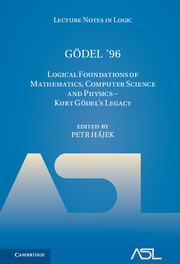Book contents
- Frontmatter
- Contents
- Preface
- Part I Invited Papers
- Part II Contributed Papers
- Gödel's Ontological Proof Revisited
- A Uniform Theorem Proving Tableau Method for Modal Logic
- Decidability of the Class in the Membership Theory NWL
- A Logical Approach to Complexity Bounds for Subtype Inequalities
- How to characterize provably total functions
- Completeness has to be restricted: Gödel's interpretation of the parameter t
- A Bounded Arithmetic Theory for Constant Depth Threshold Circuits
- Information content and computational complexity of recursive sets
- Kurt Gödel and the Consistency of R##
- Best possible answer is computable for fuzzy SLD-resolution
- The finite stages of inductive definitions
- Gödel and the Theory of Everything
- References
A Logical Approach to Complexity Bounds for Subtype Inequalities
from Part II - Contributed Papers
Published online by Cambridge University Press: 23 March 2017
- Frontmatter
- Contents
- Preface
- Part I Invited Papers
- Part II Contributed Papers
- Gödel's Ontological Proof Revisited
- A Uniform Theorem Proving Tableau Method for Modal Logic
- Decidability of the Class in the Membership Theory NWL
- A Logical Approach to Complexity Bounds for Subtype Inequalities
- How to characterize provably total functions
- Completeness has to be restricted: Gödel's interpretation of the parameter t
- A Bounded Arithmetic Theory for Constant Depth Threshold Circuits
- Information content and computational complexity of recursive sets
- Kurt Gödel and the Consistency of R##
- Best possible answer is computable for fuzzy SLD-resolution
- The finite stages of inductive definitions
- Gödel and the Theory of Everything
- References
Summary
Summary. We study complexity of type reconstruction with subtypes. As proved recently, this problem is polynomially equivalent to checking satisfiability of systems of inequalities. Therefore we concentrate an the latter problem and show how a variant of the transitive closure logic can be used to find an interesting class of posets for which this problem can be solved in polynomial time. Further we propose alternation as a framework suitable for presenting and explaining the aforementioned complexity for various classes of underlying subtype relation.
Introduction
Recent results of Hoang and Mitchell [3] show that the problem of Type Reconstruction with subtyping (TRS) is polynomial-time equivalent to the problem of Satisfiability of Subtype inequalities (SSI). So now the latter problem, as the only known algebraic equivalent of the former, gains importance in the study of foundations of programming languages involving subtyping.
In connection with SSI problem, its special case called FLAT-SSI was considered by many authors [10, 7, 8, 4, 2]. The latter is equivalent to the retractability problem, known from the theory of partial orders [6]. The purpose of the research was to provide some kind of ‘taxonomy’ amongst posets, having in mind the complexity of satisfiability-checking. The problem of FLAT-SSI attracted research interests mainly as an ‘attack route’ towards the general SSI problem, and thus towards the problem of type reconstruction with subtyping. The aim of this paper is to establish further links between SSI and FLAT-SSI. Sections 2. through 4. show that for posets for which feasibility of FLAT-SSI is witnessed by formulae of transitive closure logic, SSI is feasible too. Section 5. shows that for posets for which FLAT-SSI is NP-complete (wrt some class of reductions), SSI is PSPACE complete. It also proposes alternation as the framework within which relations between complexity of FLAT-SSI and SSI can be explained.
- Type
- Chapter
- Information
- Gödel '96Logical Foundations of Mathematics, Computer Science and Physics - Kurt Gödel's Legacy, pp. 195 - 204Publisher: Cambridge University PressPrint publication year: 2017



